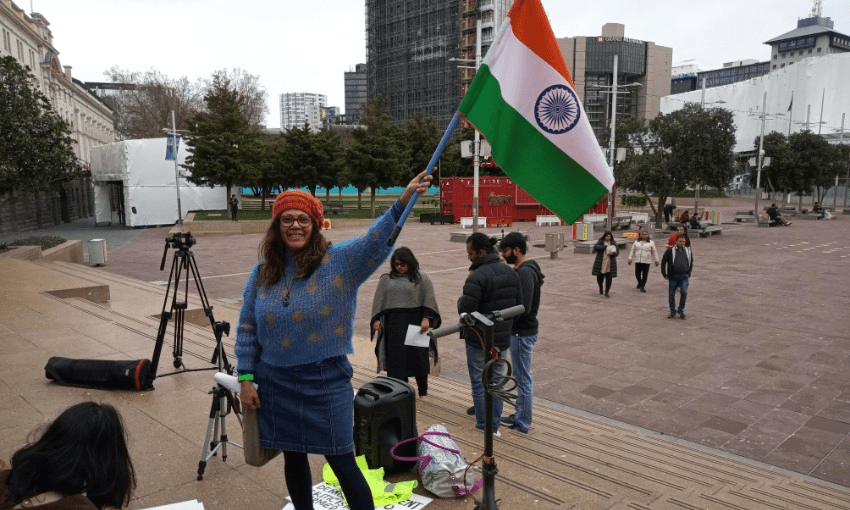Members of New Zealand’s Indian community rallied in Auckland on Sunday to raise awareness about threats to their homeland’s democracy from the rise of right-wing Hindu nationalism.
As the world’s second-most populous nation grapples with a burgeoning pandemic and deepening political and social division, about 25 protesters gathered in Auckland’s Aotea Square on Sunday to recognise those who had been caught up in the turmoil.
Organised by New Zealanders United to Save the Indian Constitution, the protest was held to raise awareness about threats to India’s democracy from the rise of right-wing Hindu nationalism and growing anti-Muslim sentiment fuelled by India’s ruling BJP party.
While it attracted a fraction of the numbers seen at the Black Lives Matter rallies last month, organiser Sapna Samant said Sunday’s protest was no less significant and was a response to the same type of ethnic and racial persecution of a minority by a powerful ruling majority.
“Every day a Muslim George Floyd dies on the streets of India,” she said.
The issue attracted global attention late last year after the Indian government enacted new pieces of legislation such as the Citizenship Amendment Act, which specifically excluded Muslims from a citizenship amnesty offered to illegal migrants from neighbouring countries. This, along with other allegedly discriminatory pieces of policy, prompted mass protests in India, which were eventually quelled with thousands of arrests and 27 deaths.
Sunday’s protest paid tribute to the activists, students and journalists who had been imprisoned and are yet to be released. Speakers read their names and personal letters and appealed for their immediate release from the squalid, overcrowded facilities, which have become far more perilous as Covid-19 continues its spread.
Anu Kaloti of the Migrant Workers Association of Aotearoa said many of those arrested were older people who would surely die behind bars. She spoke of political prisoner Gautam Navlakha, who is being held in a small quarantine facility with 350 others near Mumbai.
“There’s no space to move there. They may or not get Covid-19 but they will for sure get other infections… because people are so closely packed together.”
Along with speeches on the persecution of the queer and transgender community in India, the protest focused heavily on the annexation of Kashmir, with speakers condemning the “repressive” tactics of the Indian army to intimidate and establish control of the Kashmiri population.
New Zealand Muslim Association president Ikhlaq Kashkari said the human rights situation in India and Kashmir was never good but had deteriorated in recent years.
“The abuses that take place against minorities are being endorsed by the Indian government and Indian establishment and that’s what’s worrying.
“A very large part of the people in India enjoy it… when Kashmiris get killed, when Kashmiris get put in jail, they have celebrations.”
“People live in fear…[The] Indian army in Kashmir has used rape, torture, extrajudicial killings, mass burials as a tool of repression. They are not answerable to anybody and cannot be prosecuted.”
Kashkari, who was born in Kashmir, acknowledged the risks people were taking speaking out against the Indian government, which can sometimes result in dangerous reprisals.
“I know people are scared coming here because of repercussions for their families, even repercussions for them, and I salute some of you who have been threatened both physically and through the government agencies. I salute you for standing up,” he said.
“I will not be part of the silent majority. I will speak up if I see injustice, if I see human rights abuses taking place.”
Earlier this year, protest organiser Sapna Samant said she had been threatened by the president of the Manukau Indian Association, Veer Khar, after she organised a rally against the Citizenship Amendment Act in 2019.
At the time Khar posted on Facebook warning people that the High Commission of India may halt visas for those protesting and attending “anti-India” events. While the high commission denied it was doing this, it did not deny watching the protestors.
Samant told The Spinoff that protesting against the Indian government, even in the context of human rights abuses, was seldom approved of within the New Zealand Indian community.
“Our community over here is very, very conservative and patriarchal,” she said. “They don’t like us coming out, particularly a single woman from the community standing up to all those old folks. It’s not something that people like because it disrupts the picture of a model minority.”
She said New Zealand was the first place in the world to hold a protest against the Indian government since the Covid-19 pandemic began, and it was important for affected people in India to see they were being supported.
“We do really have a very privileged position in New Zealand. We have the ability to stand up and question different governments. We should be using that privilege to shine a light on what is going on in India.”
She urged protestors to write to their local MPs and called on the prime minister, Jacinda Ardern, to follow up on her actions after the Christchurch mosque attacks and condemn the Indian government’s Islamophobia, rather than just carrying out “performance multiculturalism”.
“Jacinda wearing a sari… not a good look if you’re not going to talk about what’s happening in India.”
The protest was closed with the singing of the Indian national anthem and speech by student doctor Prateek Vadgaonkar, who commended those who had turned up to protest what he called the “systematic devaluing of the guiding principles of the constitution of India by the very people who took an oath swearing to protect it.
“They use democracy to chip away at democracy…[they] pass laws like the CAA to divide the people into us versus them,” he said.
“I think it’s important that each and every one of us is here. Right now it’s 25 of us, but eventually we’ll fill up Aotea Square.”





